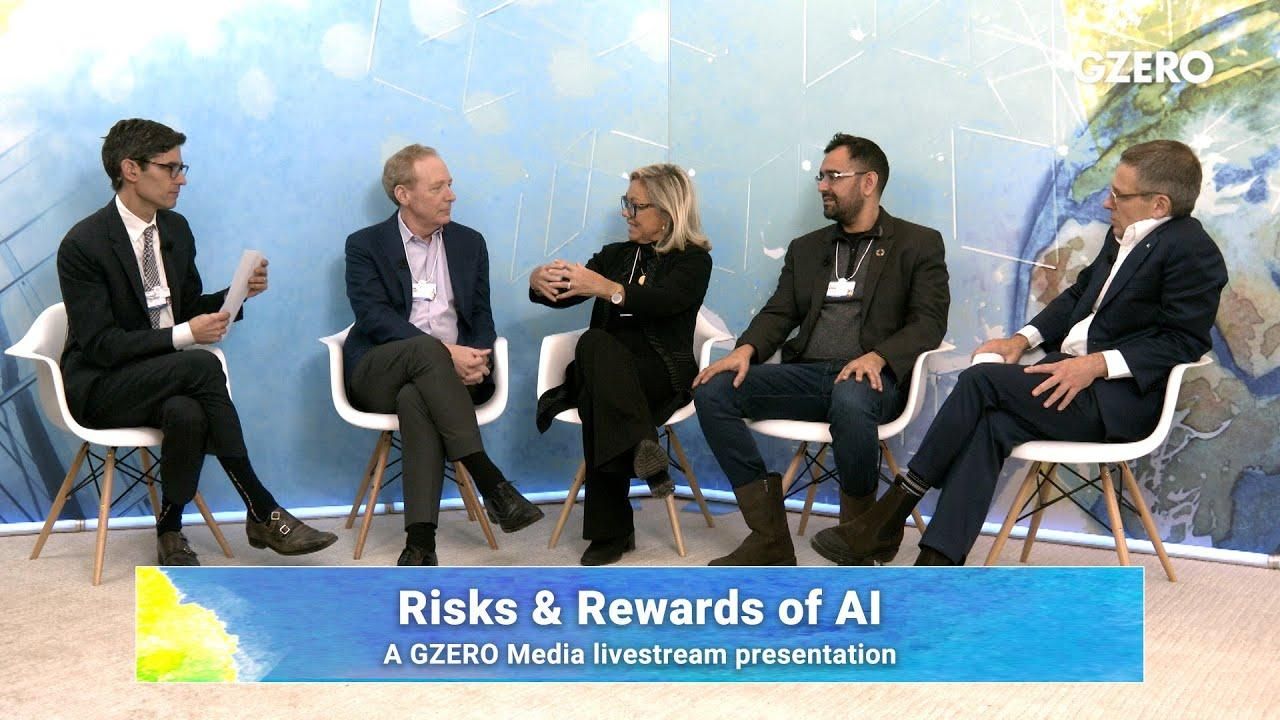Artificial intelligence is on everyone's mind these days.
But while some people are using tools like ChatGPT to write a college essay, others are thinking about how to deploy the same tech to beat the stock market — or, if you're a sneaky politician, perhaps rig an election on social media. The potential for AI to mess up democracy is scary, but the truth is that it can also make the world a better place.
So, are bots good or bad for us? We asked a few experts to weigh in during the Global Stage livestream conversation "Risks and Rewards of AI," hosted by GZERO in partnership with Microsoft at this year's World Economic Forum meeting in Davos, Switzerland.
Ian Bremmer, president of Eurasia Group and GZERO, shares his thoughts on why we're at a tipping for AI as a geopolitical risk, why the threat of disinformation has displaced the digital divide in Davos conversations, and why AI is our best shot to fight climate change. Also, he asks, what'll happen when the use of bots becomes so widespread that we start treating humans like them?
Brad Smith, president of Microsoft, explains why he thinks 2023 will be an inflection point for AI and why the tech can actually help everybody if it's developed correctly — for instance by spurring critical thinking. In response to a tough question, he defends Microsoft's recent decision to invest big in OpenAI, the creator of ChatGPT.
Eileen Donahoe, executive director of Stanford University's Global Digital Policy Incubator, wades into the debates over who should regulate AI and if should be banned. She’s as worried about the actual implications of AI for human rights as the menace of bots becoming smart, if not someday smarter, than humans.
Azeem Azhar, founder of the Exponential View newsletter, digs into how corporations are tooling up to be ready to go nuts on AI when the time is right, why open-source AI is a non-linear technological advancement, and why democracies are still ahead of China in the race to dominate AI in the future.
- Be very scared of AI + social media in politics ›
- Can we control AI before it controls us? ›
- Be more worried about artificial intelligence ›
- Kai-fu Lee: What's next for artificial intelligence? ›
- Larry Summers: Which jobs will AI replace? - GZERO Media ›
- Global Stage: Global issues at the intersection of technology, politics, and society - GZERO Media ›
- AI agents are here, but is society ready for them? - GZERO Media ›
- Azeem Azhar explores the future of AI - GZERO Media ›
- Grown-up AI conversations are finally happening, says expert Azeem Azhar - GZERO Media ›
- AI for all: Leave no one behind, says Microsoft's Brad Smith - GZERO Media ›
- How AI is changing the world of work - GZERO Media ›
- Taylor Swift AI images & the rise of deepfakes problem - GZERO Media ›
- Social media's AI wave: Are we in for a “deepfakification” of the entire internet? - GZERO Media ›
- Staving off "the dark side" of artificial intelligence: UN Deputy Secretary-General Amina Mohammed - GZERO Media ›
- Microsoft's Teresa Hutson on rebuilding trust in the Age of AI - GZERO Media ›
- Why neither the US nor China is the world’s strongest country - GZERO Media ›
- Follow GZERO Media for exclusive, on-the-ground reporting at the 78th Annual UN General Assembly - GZERO Media ›
- Who can solve the world's "emergency of global proportions"? - GZERO Media ›
- The Graphic Truth: The kids are not all right - GZERO Media ›
- Shocks making it harder to meet Sustainable Development Goals | Climate | GZERO Media ›
More For You
China was largely absent from the core conversations at the 2026 Munich Security Conference. That, says Ian Bremmer, is telling.
Most Popular
At the 2026 Munich Security Conference, Brad Smith announces the launch of the Trusted Tech Alliance, a coalition of global technology leaders, including Microsoft, committing to secure cross-border tech flows, ethical governance, and stronger data protections.
When the US shift from defending the postwar rules-based order to challenging it, what kind of global system emerges? CFR President Michael Froman joins Ian Bremmer on the GZERO World Podcast to discuss the global order under Trump's second term.
TODAY at 12 pm ET: Watch our Global Stage live premiere from the Munich Security Conference
Tune in today at 12pm ET/6pm CET for the live premiere of our Global Stage from the 2026 Munich Security Conference, where our panel of experts takes aim at the latest global security challenges. NY Times National Security Correspondent David Sanger moderates the discussion with Benedetta Berti, Secretary General, NATO Parliamentary Assembly; Ian Bremmer, President & Co-founder, Eurasia Group & GZERO Media; Dr. Wolfgang Dierker, Global Head of Government Affairs, SAP; and Brad Smith, Vice Chair & President, Microsoft.
